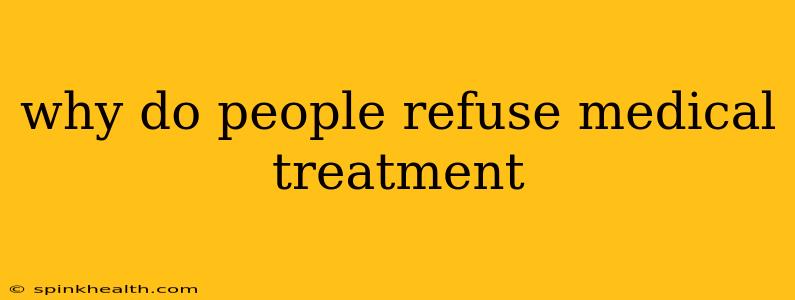Why Do People Refuse Medical Treatment? A Journey into the Complexities of Healthcare Decisions
The decision to refuse medical treatment is a deeply personal one, often fraught with complex emotional, spiritual, and practical considerations. It's not a simple "yes" or "no," but a journey shaped by individual beliefs, circumstances, and the very nature of the medical intervention itself. Understanding the reasons behind these refusals requires empathy and a nuanced perspective, going beyond simple generalizations.
This exploration delves into the multifaceted reasons why individuals might choose to forgo medical treatment, considering both the individual and societal implications.
What are the main reasons people refuse medical treatment?
This is a question with many answers, varying greatly depending on the individual and the specific treatment offered. Some overarching themes consistently emerge, however:
-
Concerns about the treatment itself: This is often the most straightforward reason. Individuals may fear the pain, discomfort, or side effects associated with a particular treatment. The invasiveness of a procedure, potential long-term consequences, and the perceived risk-benefit ratio all play a significant role. For example, a patient might refuse chemotherapy due to the debilitating side effects, even if it offers a chance at remission.
-
Lack of trust in the medical system: Mistrust in healthcare providers, hospitals, or the pharmaceutical industry can be a powerful motivator for refusing treatment. This could stem from past negative experiences, cultural beliefs, or a perceived lack of transparency regarding treatment plans and risks.
-
Religious or spiritual beliefs: Certain religious or spiritual beliefs may dictate a refusal of particular medical interventions, such as blood transfusions or certain types of surgery. These beliefs often hold a deep-seated moral and ethical significance.
-
Financial constraints: The high cost of medical treatment is a significant barrier for many individuals. The inability to afford necessary medication, procedures, or ongoing care can lead to a de facto refusal of treatment, even if the patient desires it.
-
Cultural beliefs and practices: Cultural norms and traditions can significantly influence healthcare decisions. Some cultures may prioritize traditional healing methods over Western medicine, leading to a rejection of conventional treatments. Misunderstandings or communication barriers between healthcare providers and patients from different cultural backgrounds can also contribute to treatment refusal.
-
Autonomy and control: The desire for autonomy and control over one's own body and life is a fundamental human right. Individuals may refuse treatment as an assertion of their right to make choices about their own health, even if those choices differ from the recommendations of healthcare professionals.
What are some examples of medical treatments people often refuse?
Specific examples are numerous, but common ones include:
- Chemotherapy: Due to severe side effects.
- Blood transfusions: Due to religious or personal beliefs.
- Surgery: Due to fear, invasiveness, or perceived risks.
- Vaccination: Due to concerns about safety or efficacy.
- Organ transplantation: Due to religious beliefs or fear of the procedure.
How common is it for people to refuse medical treatment?
The frequency of medical treatment refusal varies considerably, depending on the type of treatment, patient demographics, and cultural context. While precise statistics are difficult to obtain, it's clear that refusal of medically recommended treatments is a significant issue with potential implications for patient outcomes and healthcare resource allocation.
Can a person legally refuse medical treatment?
In most jurisdictions, competent adults have the legal right to refuse medical treatment, even if that refusal might result in death or serious harm. This right is rooted in the principle of patient autonomy and self-determination. However, there are exceptions, such as when a person is deemed incompetent to make such decisions or when a refusal poses a threat to public health (e.g., contagious diseases).
The decision to refuse medical treatment is intensely personal and requires a careful consideration of individual values, beliefs, and circumstances within the context of a supportive and informative healthcare relationship. Understanding the multifaceted reasons behind these decisions is crucial for providing compassionate and effective care.

